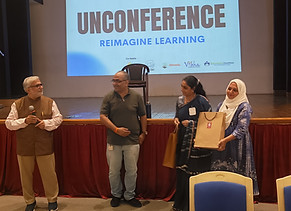
Reimagining Learning Spaces: Where Education Meets Life
In a time where the world is evolving faster than ever, it's critical to pause and ask: What if?
What if learning wasn't bound by walls, hours, exams, or marks? What if we reimagined education to be deeply human, contextual, and rooted in real life?
This was the central provocation at our recent unconference on Alternative Schooling: What If ? where educators, parents, facilitators, and changemakers came together to reflect on the kind of education that truly serves the child-and society.
What Are We Reimagining?
We're reimagining spaces-not just physical, but emotional, intellectual, and cultural. Spaces that feel safe, open, and inclusive.
We're rethinking what learning looks like, who defines it, and how it's measured. And most importantly, we're questioning what education should lead to.
There's a growing gap between what education claims to prepare children for, and the reality they live in. Why is there such a disconnect between the real and the reel? Between lived experiences and what's taught in textbooks?
Systemic Gaps and Paradoxes
The current education system is full of paradoxes. On one hand, there's a push for "open learning," and on the other, rigid filtering and gatekeeping mechanisms.
It's costly, competitive, and increasingly misaligned with the world it claims to serve.
We must ask:
- What are we really preparing children for in a world that is constantly shifting?
- Why is autonomy such a rare privilege in mainstream classrooms?
- Shouldn't education be built on equity, not exclusion?
Is There a Flip Side?
Many wonders if alternative schooling can match the outcomes of mainstream education. But perhaps we're asking the wrong question.
Alternative education is not a watered-down version of the mainstream.
It's not about doing less-it's about doing differently.
It prioritizes:
- Lived experience over rote learning
- Curiosity over conformity
- Autonomy over compliance
What it often lacks is the societal recognition and systemic support it deserves.
One Size Does Not Fit All
We cannot keep applying cut-paste models to diverse learners.
The need of the hour is a mindset shift: to embrace contextual, interdisciplinary, and solution-oriented approaches to learning.
Education must evolve from:
- Textbook to lifebook
- Passive listening to active inquiry
- Marks-focused outcomes to meaningful, relevant applications
Subjects should reflect real-world relevance. Think maths for budgeting, science for sustainability, and literature for empathy.
Addressing the Child's Core
At the heart of education is the child.
And every child deserves to be:
- Happy
- Balanced
- Skilled for life
Yet, these core needs are often sidelined in favor of performance metrics.
Arts, sports, and hobbies start disappearing from children's lives by the time they enter middle school.
Expression narrows, pressure builds-and joy is lost.
The Illusion of Success
We've created narrow yardsticks of success: the career you choose, the marks you score, the ranks you attain.
Even immersive subjects like literature are now expected to deliver measurable outcomes.
Where is the space for passion? For wonder? For questioning?
Transforming, Not Tweaking
We don't just need educational reform-we need transformation.
This is a breakdown moment and a breakthrough opportunity.
We must build systems that prioritize:
- Collaboration
- Dialogue
- Teacher training and mentoring
- Knowledge sharing and open-source models
Education must serve as a bridge-not a barrier-between self, society, and nature.
The Cost of Disconnect
When education fails to address the human core, the consequences are grave.
Rising cases of depression, anxiety, and even suicide among young people are not isolated incidents-they are symptoms of a deeper malaise.
Today's families are fragmented. Parents are stretched thin.
The social fabric is fraying, and education isn't stepping in to weave it back together.
We need action-not just at the school level, but at the policy level.
Can We Even Measure Learning?
Here's the paradox:
We try to measure learning in fixed units-marks, grades, percentages-yet learning is fluid, dynamic, and lifelong.
If education is truly a lived experience, can it really be assessed by the same metric for every learner?
What if learning wasn't:
- Time-bound
- Hierarchical
- Output-based?
What if we designed systems that allowed for design thinking, parental involvement, and contextual adaptations?
And now, AI Enters the Classroom
With tech giants introducing AI in primary and middle school classrooms, we are at a new crossroads.
Will AI empower creativity and autonomy-or further automate conformity?
The choices we make today will shape not just future learners, but the very future of learning itself.
Final Thoughts: The Call to Action
We must create possibilities, not perpetuate limitations.
Alternative education is not a deviation-it is an invitation.
An invitation to reimagine what it means to grow, learn, connect, and be fully human.
And the question we must keep asking ourselves is:
What if?
By Tarannum Khan
Alternative Educator - Reimagining Learning Spaces
